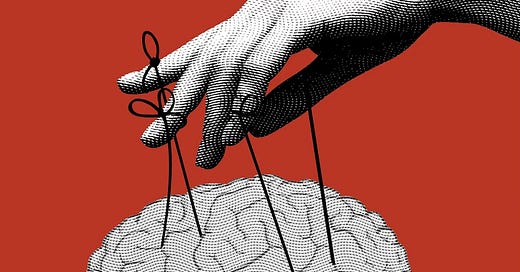Carl Jung: The One Thing That Irritates You Most Reveals Your Biggest Secret
25 ideas to build “zero-resistance” habits.
Postanly Weekly is a reader-supported smarter living newsletter. To support my work, you can upgrade to a paid subscription for $7 per month or $40 for an entire year. With a modest yearly contribution you’re not only helping keep Postanly Weekly going, you also get free access to Thinking Toolbox (mental models for life) and Mental Wealth Toolbox (practical concepts for smarter decisions).
In partnership with Meco
Meco is the perfect app if you read lots of newsletters.
Declutter your inbox in seconds by using a newsletter aggregator built for reading. Your inbox wasn’t built for reading. Meco helps you move your newsletters to a space built for reading and declutter your reading experience in seconds. Read all your awesome newsletters and Substacks on the app designed for reading.
Everything That Irritates You About Others is a Mirror, According to Carl Jung
Humans are wired for connection. From family to friends, colleagues to communities, we want a sense of acceptance and validation from the people who matter to us. But in the presence of others, we find ourselves irritated, frustrated or upset. Some personality triats or habit may annoy you or even trigger an insecure moment. For example, if someone is always late and it bothers us, it may be because we value punctuality and timeliness in ourselves and others, and feel that the other person is not respecting or valuing our time. In a different experience, if someone is very outspoken and we find ourselves getting annoyed by them, it may be because we are uncomfortable with expressing our own opinions or feel uncertain about our beliefs.
We can gain greater self-awareness and understanding by examining our reactions to others and exploring the underlying reasons for our feelings.
When we become triggered, we must take a step back and analyse why these things bother us. Understanding what irritates us about others can also be vital to understanding ourselves,” Carl Jung observed.
Self-awareness leads to self-correction
“Everything that irritates us about others can lead us to an understanding of ourselves,” says Jung, a pioneering psychologist, philosopher, and researcher of the human mind. He is best known for his theory of the “collective unconscious” and for pioneering work in analytic psychology.
Jung’s findings may seem counterintuitive, but reveals a profound truth about human psychology. Our reactions to the behaviour and traits of others can reveal deep-seated insecurities, fears, and unresolved issues within ourselves. By paying attention to and reflecting on these reactions, we can gain valuable insights into our psyche and learn to understand our behaviour better.
Jung believed this self-discovery process was essential for personal growth and fulfilment and could help us become more compassionate, empathetic, and self-aware. According to Jung, the things that bother us most about other people are often projections of our unresolved issues, fears, and insecurities.
By examining these triggers and exploring their deeper meaning, we can gain valuable self-knowledge and a better understanding of our psychological landscape. Jung’s observation is based on the concept of shadow work, which involves bringing our unconscious thoughts, feelings, and behaviours to the surfaceand integrating them into our conscious awareness.
Irritation is a small emotion with big consequences.
It tells us what we need to know about our beliefs, feelings and preferences. When we feel irritated by something or someone, it means some red flags are going up in our minds. You may not even realise it, but other people constantly provoke you.Whether intentionally or unintentionally, people will say and do things that trigger a reaction in you.
In some cases, these reactions are subtle and can be explained as isolated incidents. However, most of the time, these reactions are more significant than they appear on the surface. They are red flags that something deeper is going on inside of you. Even if you don’t think someone’s comment or action was intentional, there is almost always a reason why you reacted the way you did.
Irritation is key to mastering yourself
Lao Tzu also said, “Knowing others is intelligence; knowing yourself is true wisdom. Mastering others is strength; mastering yourself is true power.”
Irritation and annoyance are warning signals that something about yourself needs to change so that you will feel differently about someone else in the future. The things that irritate us about others give us insight into our flaws and unresolved issues from the past we need to address if we want healthier relationships moving forward.
We don’t get annoyed by things randomly; rather, we respond negatively to things that come across as untrue, unnatural, or false because of our assumptions and realities. Understanding why certain people drive us up the wall helps us identify our own beliefs more clearly — and, in turn, gives us insight into what we like and dislike about ourselves.
“To become different from what we are, we must have some awareness of what we are,” says Eric Hoffer. The more profound question is: why do we find some people so irritating?
The answer is simple: What irritates you about them is likely something that also irritates you about yourself. Spending quality time with others can be challenging at times. There are bound to be moments when you feel irritated or upset by something another person says or does.
However, it can also be a fantastic opportunity for self-discovery and learning about yourself and what you value most.
Self-knowledge is key to psychological freedom
“When I discover who I am, I’ll be free,” Ralph Ellison said.
Understanding why certain things irritate you about others and what that says about you is challenging but extremely insightful.
When we feel irritated or frustrated with someone else, it may be because they express qualities, habits or behaviours we find challenging or uncomfortable. Strong emotional reactions to others can also signal that we are projecting our issues onto them. Projection is a defence mechanism in which we unconsciously attribute our own thoughts, feelings, and behaviours to others, often as a way of avoiding or denying them in ourselves.
For example, if we are prone to being judgmental and critical of others, we may become easily irritated by people we perceive as judgmental and critical towards us. That’s because we are projecting our inner critic onto others and cannot acknowledge and accept our faults and shortcomings.
“Whenever you are about to find fault with someone, ask yourself the following question: What fault of mine most nearly resembles the one I am about to criticize?”, says Marcus Aurelius.
By recognising and examining our projections, we can gain insight into our own emotional patterns and work towards resolving any underlying issues. The process can lead to greater self-awareness, self-acceptance, and improved relationships.
“Until you make the unconscious conscious, it will direct your life and you will call it fate,” Carl Jung said.
In summary, while it can be challenging to acknowledge and confront our negative qualities and patterns of behaviour, paying attention to our reactions to others can provide valuable insight into ourselves.
When we embrace our strengths and weaknesses and work towards greater self-awareness and growth, we can cultivate more fulfilling and authentic relationships with those around us. You can’t get away from yourself, so why not get to know yourself and improve your psychological well-being?
Look for clues in your daily interactions and self-correct in the future.
Food for thought
25 ideas to build “zero-resistance” habits
A “Zero-resistance” habit is a behaviour that has been developed to the point where it requires no conscious effort or willpower to maintain.
“A habit is a cable; we weave a thread each day, and at last we cannot break it.” —Horace Mann
Find your why — focus on why the habit is essential to you.
Connecting your habits to a larger sense of purpose and meaning can provide motivation and direction.
Start ridiculously small and simple.
Break the habit down into tiny manageable daily actions.
Begin with a manageable action you can easily integrate into your present routine.
Focus on daily small wins.
Track your progress and celebrate your wins.
Find a way to make the habit fun, such as incorporating music, gamification, or a competitive element.
Find a substitute for any distraction that might derail good habits.
If a habit is difficult to give up, try finding a healthier alternative to replace it.
Create a system of rewards for when you reach certain milestones, which can help keep you motivated.
Associate the habit with a cue (reminder) or trigger — such as after breakfast or before bed, read for 10 minutes.
Specify when, where, and how you will achieve daily actions.
Continuously evaluate and adjust the habit.
Take breaks and avoid burnout.
Use reminder systems to stay on track.
Instead of just focusing on the end goal, enjoy the journey and the process of developing the habit.
Find someone to share your progress with, or join a group for support and motivation.
Experiment and have fun — do more of what’s working.
Seek inspiration from others who have successfully built similar habits.
Avoid boredom by finding different ways to engage in the habit, such as changing the environment or adding new elements.
Use setbacks as opportunities to learn and grow.
Regularly reflect on your habit formation journey — evaluate what is and isn’t working. Use this information to make adjustments and improvements.
Keep a record of your progress to hold yourself accountable and monitor improvement.
Take advantage of books, podcasts, or online courses, to learn more about what works and how to improve.
Bill Perkins on the value of experiences
“Since the whole point of money is to have experiences, investing money to get a return with which to have experiences is a roundabout way of having experiences. Why go through all that when you can just invest directly in experiences—and get a return on experiences? Not only that, but the number of actual experiences available to you diminishes as you age. Yes, you need money to survive in retirement, but the main thing you’ll be retiring on will be your memories—so make sure you invest enough in those.”
Source: Die With Zero: Getting All You Can from Your Money and Your Life
One more things
> Personal growth newsletters I recommend
A few of the best free newsletters helping me build a learning engine for personal growth.
Check our my favourite picks →
Until Next Week,
Be Well.
Thomas
Medium | All Courses | The Write Life | Philosophy For Modern Life
Postanly Weekly is a reader-supported smarter living newsletter. To support my work, you can upgrade to a paid subscription for $7 per month or $40 for an entire year. With a modest yearly contribution you’re not only helping keep Postanly Weekly going, you also get free access to Thinking Toolbox (mental models for life) and Mental Wealth Toolbox (practical concepts for smarter decisions).






This one hit me in the chest. The idea that what irritates me in others is often a reflection of something unresolved in myself... I’ve known it intellectually, but this piece helped me feel it more viscerally. Especially appreciated the reminder from Jung: “Until you make the unconscious conscious, it will direct your life and you will call it fate.” That line alone is worth a reread every week. Thank you for turning irritation into a compass for growth.